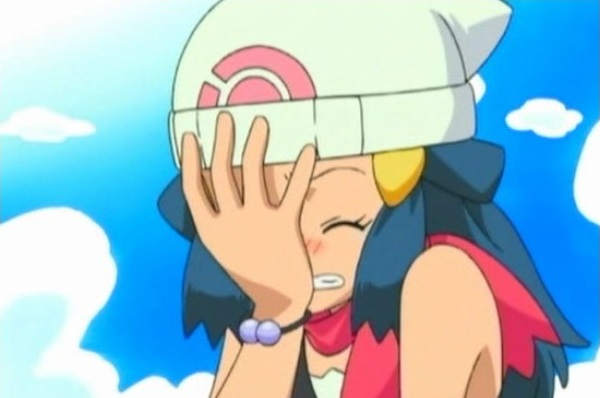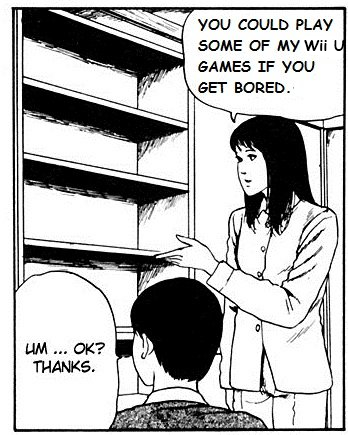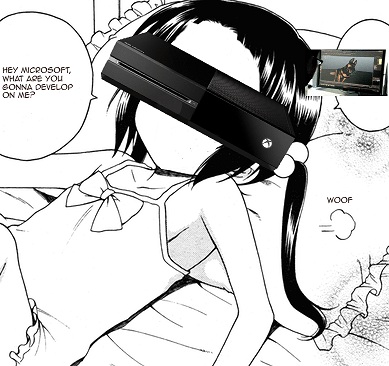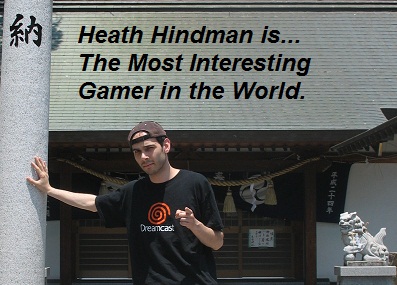If you don't like what he likes, you're a nationalist bigot.
The name "
Xbox Divorce" is apparently more symbolic than originally thought, as Microsoft has been dropping restrictive chains from the system rapidly. In addition to the removal of its ridiculous DRM and second-hand game policies, the Box also went region-free; in Captain Planet fashion, these powers combined have given the Xbox One a second chance in Japan. Were the X1 to shun a healthy secondhand market and favor daily online check-ins, its trip to an early grave would have been a sure thing rather than a likely story.
Xbox One still has a tough fight for survival ahead of it, but not for the reasons you might think.
There's a misconception that the original Xbox and the 360 experienced terribad Japanese sales because they were foreign. I often see the sentiment "Japanese gamers don't buy Western products" expressed. All of the palms. All of the faces. All of the disappoint.

No. Look, Japan has some lingering xenophobia, that's for sure, but to think that its people don't buy something because it's foreign is some ridiculous thinking. Just off the top of my head…
Two of the most popular food joints here are Starbucks and McDonald's. In fact, when I ask kids (usually ages 6-12) what their favorite restaurant is, McDonald's is almost always the answer. When I ask them to list more, a lot of kids can't name a single other restaurant that they like, by name. Adults, especially University students, are equally quick to name Starbucks. These two easily stomp Japanese staples like Sukiya, Mos Burger, Sushiro, Hanamaru, and Hotto Motto, in addition to local one-off places. Some of the most popular clothes and accessories have the American stars and stripes or the British Union Jack. But this hip international flavor doesn't stop with food or fashion in Japan.

Smrt phones have been all the rage in Japan for years. While it took Apple's iPhone a lot longer to take flight in Japan than other territories, that was due to Apple being very late to the smartphone party, not so much due to the device being foreign or unappealing. Japan's phones had been making other mobile devices look primitive for some time, so the first run of the iPhone didn't offer much that hadn't been seen before. Customers already being locked into yet-to-expire contracts with smartphone providers could not very easily jump onto the newcomer.
But now? By the numbers, iPhone is the most popular type of smart phone in the country, and it's been that way since the iPhone 4. The September 2012 launch of the iPhone 5 proved a huge challenge for Apple, as it struggled to keep up with Japanese demand for its new phone. Even some customers who pre-ordered the device were made to wait over a month for it to actually arrive in their hands. What's that about Japanese people hating American things, again? I can't hear you over the sound of all these ringing iPhones.
American and European movies are readily marketed in Japanese theaters, as they continue to see financial success. The radio plays a constant stream of music from all over the world. Oh, yes, you bet that there are lots and lots of Japan-only films and songs that get just as much hype the international stuff, if not more. That's kind of, you know, natural for every single fricking country in the world, though.

Some asshole once tried to work me into a checkmate with some shit about Sony's MP3 player being successful in Japan but nowhere else. Since I've seen this brought up online multiple times, I'll mention here and just throw out a giant Who-Gives-A-Fuck. Whatever your personal beliefs, Sony has a reputation for making good stuff. I know some haters are gonna pull their anecdotes and whatnot, but they'd be sunken right now if they didn't have an overall positive reputation. Surprise, surprise, a popular company made a successful product in its homeland, just like an assload of other companies can claim about their products in their home countries. If Volvo makes a certain model of car that's only popular in Sweden, it's not because Swedish people hate the world and only cling to their own things.
I sometimes feel like my fellow Americans have become far too accustomed to virtually unchallenged international success that when something American doesn't succeed in a certain country, they search for something that must be wrong with that place rather than something wrong with the product being sold. With that in mind, I ask these questions: What did Xbox or the 360 offer Japanese gamers that other systems didn't? What exclusive software did the Xbox 360 have that seem fitted to the general tastes of the Japanese market? Was there anywhere near enough?

The two quick answers might be Lost Odyssey and Blue Dragon, a pair of Mistwalker RPGs. It's true, those are two games that the Japanese market should be all over. But new IPs by new development houses (even ones with famous names behind them) prove time and time again to have a more difficult time in the marketplace than established names by older companies. It's a sad fact of life. Hardcore gaming enthusiasts like you might say that you'll give any good-looking game a chance, no matter the dev or series. That mentality, sadly, doesn't transfer to the mass-market gamer. You being interested in a game doesn't make it sell well enough to satisfy its creators. Lost Odyssey is a case in this point, while Blue Dragon proves an exception to the rule, as it was the first strong force in moving 360 hardware and software. Its boost, however, was temporary; like so many others.
Tales of Vesperia provided more hope in 2008. Once again, the time-tested model of providing an appealing exclusive led to increased hardware sales, as the Xbox 360 was sold out everywhere. As unreal as that sounds, it's true—there was a time in Japan when you had to hunt all over town in desperate hopes of landing an Xbox 360.

Something similar happened when Star Ocean: The Last Hope launched in 2009. Hardware sales saw a spike, and the game became the system's overall best seller in Japan.
Even some titles that you might not normally associate with the typical Japanese gamer have been seeing success in recent times (this is true on all platforms, but for now, I'm just talking Xbox). When first-person shooter
Halo 4 launched last fall, it
took third place overall on the software sales charts, surrendering only to
Animal Crossing and
Dynasty Warriors, both of which are among the nation's most loved franchises.
Are you noticing an unfortunate pattern here? These releases are coming several months, if not
years apart. That pattern can't sustain any console at all. We're seeing it happen right before our eyes these days, as well, with the PS Vita and Wii U
failing to meet sales goals. Even in their home country of Japan, Sony and Nintendo are having a rough time, and it's no secret that both are suffering from a lack of software.

In the previous handheld race, the PSP may have been outsold by the Nintendo DS, sure, but it was still a clear success in Japan. This is thanks to having a combination of both strong hardware and a consistent software schedule. It had adventures, visual novels, and most importantly, RPGs, dropping with regularity. Even earlier this year, a PSP game spent a week as the nation's best seller. Yeah, the "dead" PSP has been quite alive in Japan, and has only started to slow down these last few months. Software sells hardware. Solving this riddle is as easy as taking candy from a pie.
The worst part of the saga above is that it has given Xbox gamers in Japan more than enough reason to be gun-shy on a potential Xbox One purchase. Both
Star Ocean IV and
Tales of Vesperia received enhanced PS3 ports a mere year later, and in the case of
Vesperia, the latter version was clearly the superior product (featuring twice as much voice work, more characters, and tons of other features). So not only is Microsoft known as a company that waffles on its own vision, but it also has to deal with an inability to assure customers that third-party exclusives have any chance of remaining exclusive. Gamers can't be sure which titles will stay exclusive to the box, nor can they even be sure which direction Microsoft is going to steer its console business. The Japanese had little reason to buy an Xbox in either of the last two generations, regardless of what country it came from. From looks of things, little has changed this time around.

The PlayStation 4 will presumably be launching in Japan at a lower price point than Xbox One (matching the worldwide pattern), in addition to riding a wave of three straight console success stories. Is that not more of a draw than the system that costs an extra $100 and is made by a company that has produced back-to-back duds? The Wii U is on life support, but its doctors have resurrected systems in the past. Once its software starts to actually exist, it'll boast exclusive appeal and only add to the Xbox One's problems in Japan.
Nintendo and Sony might be Japanese companies, but that isn't why they're thumping Microsoft in Japan. They have exclusive titles in genres that appeal to the local audience, they have friendlier price tags, and they have longer legacies of gaming success. Microsoft is likely to lose the Japanese portion of the console war, but it's got nothing to do with the address of its home office.
Stay cosmopolitan, my friends.


















